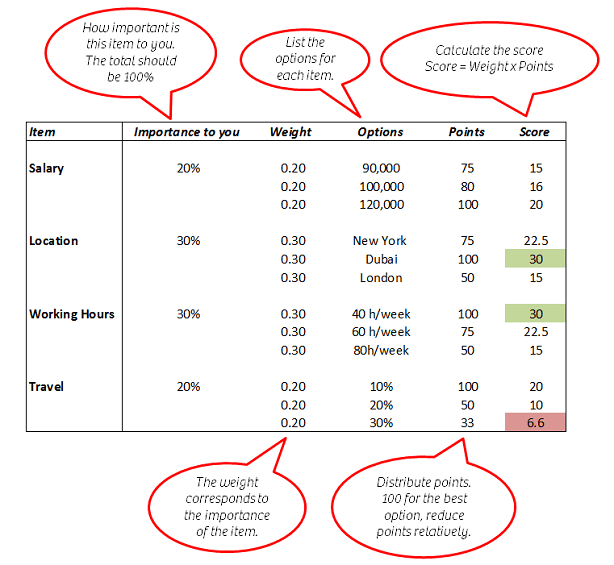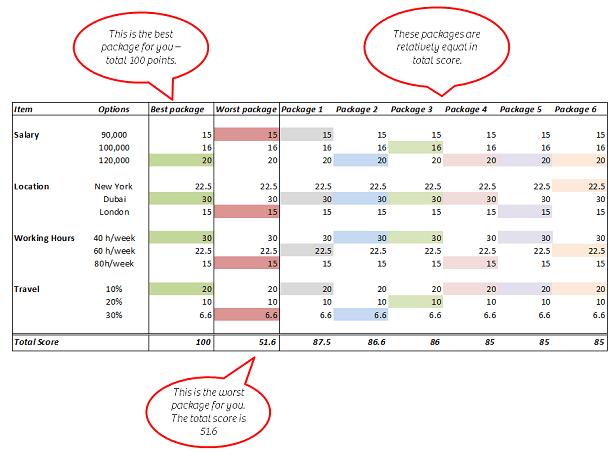Key tips for how to negotiate successfully
Up until a year ago, I detested negotiations. I’ve always heard that I’m terrible at bargaining. I would rather pay up and get it over with than stand and argue about the price. Then something changed, I attended Professor Niro Sivanathan’s course “Negotiation and Bargaining” at London Business School and it all changed. Now I see a negotiation as an interesting challenge and I welcome situations where I’m able to negotiate. A lot of research has been done on the topic, and there are numerous books you can read. In this blog post, I wanted to share with you my key takeaways on how to negotiate successfully.
Your single greatest source of power – your BATNA
 The most important thing in a negotiation is for you to know your BATNA – Best Alternative To Negotiated Agreement. “What are you going to do if you don’t reach an agreement?” If you have been offered a new job and you are negotiating the benefits, what are your alternatives if you can’t reach an agreement? Do you have another job offer on the table? Can you stay at your current job? You always have a BATNA, don’t ever walk into a negotiation without knowing what your alternatives are. In the negotiation, you can highlight BATNA strengths without going into specifics. For example, “I have been offered another job that I am also considering”. It’s important that you never lie about your BATNA, this can damage your reputation, and in some countries, it can actually be illegal.
The most important thing in a negotiation is for you to know your BATNA – Best Alternative To Negotiated Agreement. “What are you going to do if you don’t reach an agreement?” If you have been offered a new job and you are negotiating the benefits, what are your alternatives if you can’t reach an agreement? Do you have another job offer on the table? Can you stay at your current job? You always have a BATNA, don’t ever walk into a negotiation without knowing what your alternatives are. In the negotiation, you can highlight BATNA strengths without going into specifics. For example, “I have been offered another job that I am also considering”. It’s important that you never lie about your BATNA, this can damage your reputation, and in some countries, it can actually be illegal.
Do proper research
Successful negotiators are the ones that are properly prepared; they have done their research and documented their interests and priorities. Here are some things you should be a hundred percent clear on before going into a negotiation.
Target price
What is your target price? Say that you are selling your house. What price are you aiming for? Set an aggressive target price and focus on this when you enter the negotiation.
Reservation price
What is your reservation price? This is your walk away price, below/above this price you will walk out of the negotiation without an agreement. You need to keep your reservation price a well-kept secret – you should never, ever reveal this to your counterpart.
Interests and Priorities
What are your interests and priorities? If you are negotiating the benefits of a new job, you need to know how important various items are to you. How important is the location? Working hours? Salary? Stock options? Traveling? How do you prioritize these? In order to compare various options, it really helps to introduce a scoring system. You can do this quite easily. For example, list all items, set a “weight” to each item based on the importance to you, and then distribute points to the different options. See the following example:
When you have a scoring table like this, you can easily see what is most important to you. In the example above Dubai as the location and 40 hour work weeks are the most important aspects and whether or not you need to travel 30% is the least important aspect. When you have a scoring table it is much easier for you to negotiate various packages.
Concessions
Concessions are your most important currencies at the negotiation table. Concessions should be bilateral in nature, meaning that if you make a concession, say for instance that you agree to a lower salary, your counterpart should also make a concession and offer you, for instance, a better health insurance. In order to give concessions and make trade-offs you need to know how important different things are to you. For example, I’m willing to work 60 hours a week if we limit the traveling to 20%. When you have your scoring system in place it is much easier to make concessions. Signal information about your priorities and interests by the size of your concessions. Make your concessions smaller as you approach your goal.
Always make the first offer using anchoring
A big question when it comes to negotiations is – who should make the first offer? On this, our Professor was very clear. He said, you should always make the first offer and when you do you should make sure to use anchoring. Anchoring makes a substantial difference in bargaining. So what is it? Well, say that you are selling your car, your target price is 5000 dollars and your reservation price is 3000. When the buyer asks you what the price is you say, “the price is 7000 because I just changed the tires, it has been through a full-body service and I’ve never been in an accident with the car”. 7000 is the anchor. The anchor price, in this case, is higher than your target price, but it shouldn’t be totally unreasonable (if it is you risk the chance of upsetting your counterpart). It needs to be something that you can give some rationale for. First, give the number and then explain your reason why. Research has shown that people tend to stick to the anchor and not move too far from it.
First create value – then claim!
Negotiation is more about listening than talking. Ask questions in order to find out your counterpart’s interests and priorities. Have a win/win mindset – think about the relationship and creating as much value as possible for both parties. In our example with the job negotiation, it might very well be that Dubai is the preferred location for both parties. First create value – then claim!
Focus on interests – not positions!
 It’s really important in negotiations that you focus on interests, don’t get fixated on positions. If a negotiation turns into a dispute it’s important that you try to keep cool and make sure not to get personal. It can help to apologize for “the situation” – this is not to say that you have done something wrong. For example, “I’m really sorry that we are in this unfortunate situation, let’s try to put emotions aside and focus on solving this with the best possible outcome for both parties.” If you do need to make a threat, make sure that it is wise. A wise threat means that there is a willingness to carry it through, it is focused on interests and that it is precise and credible. You should never make a threat when you are influenced by anger. You should see a threat as a way to fulfill your own interests – not a punishment. It’s important to know that threats push neurological buttons which crave retaliation, so do your best to stay away from making threats.
It’s really important in negotiations that you focus on interests, don’t get fixated on positions. If a negotiation turns into a dispute it’s important that you try to keep cool and make sure not to get personal. It can help to apologize for “the situation” – this is not to say that you have done something wrong. For example, “I’m really sorry that we are in this unfortunate situation, let’s try to put emotions aside and focus on solving this with the best possible outcome for both parties.” If you do need to make a threat, make sure that it is wise. A wise threat means that there is a willingness to carry it through, it is focused on interests and that it is precise and credible. You should never make a threat when you are influenced by anger. You should see a threat as a way to fulfill your own interests – not a punishment. It’s important to know that threats push neurological buttons which crave retaliation, so do your best to stay away from making threats.
Like always – practice makes perfect!
As with everything else, it takes practice to become a successful negotiator. The good thing is that you don’t have to wait for your yearly salary negotiation to practice; there are opportunities for negotiations everywhere. You just need to spot them!
For me an important aspect of negotiations is the effect it has on the relationship. I seldom want to get into a negotiation if it harms the relationship with the counterpart. However, if you negotiate following the advice above, you are increasing the value for both parties and you walk out of the negotiation with a win/win outcome – relationship intact or even strengthened!
(If you have difficulties reading this article, you can access the full article in pdf here)



